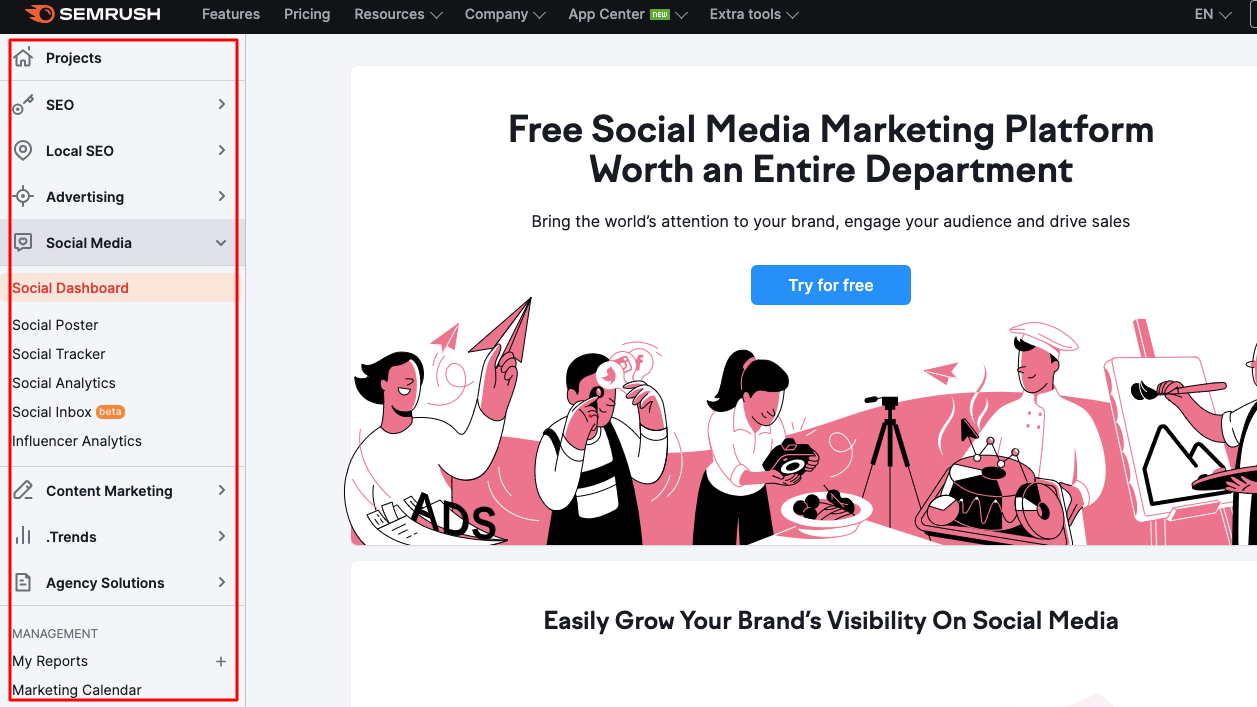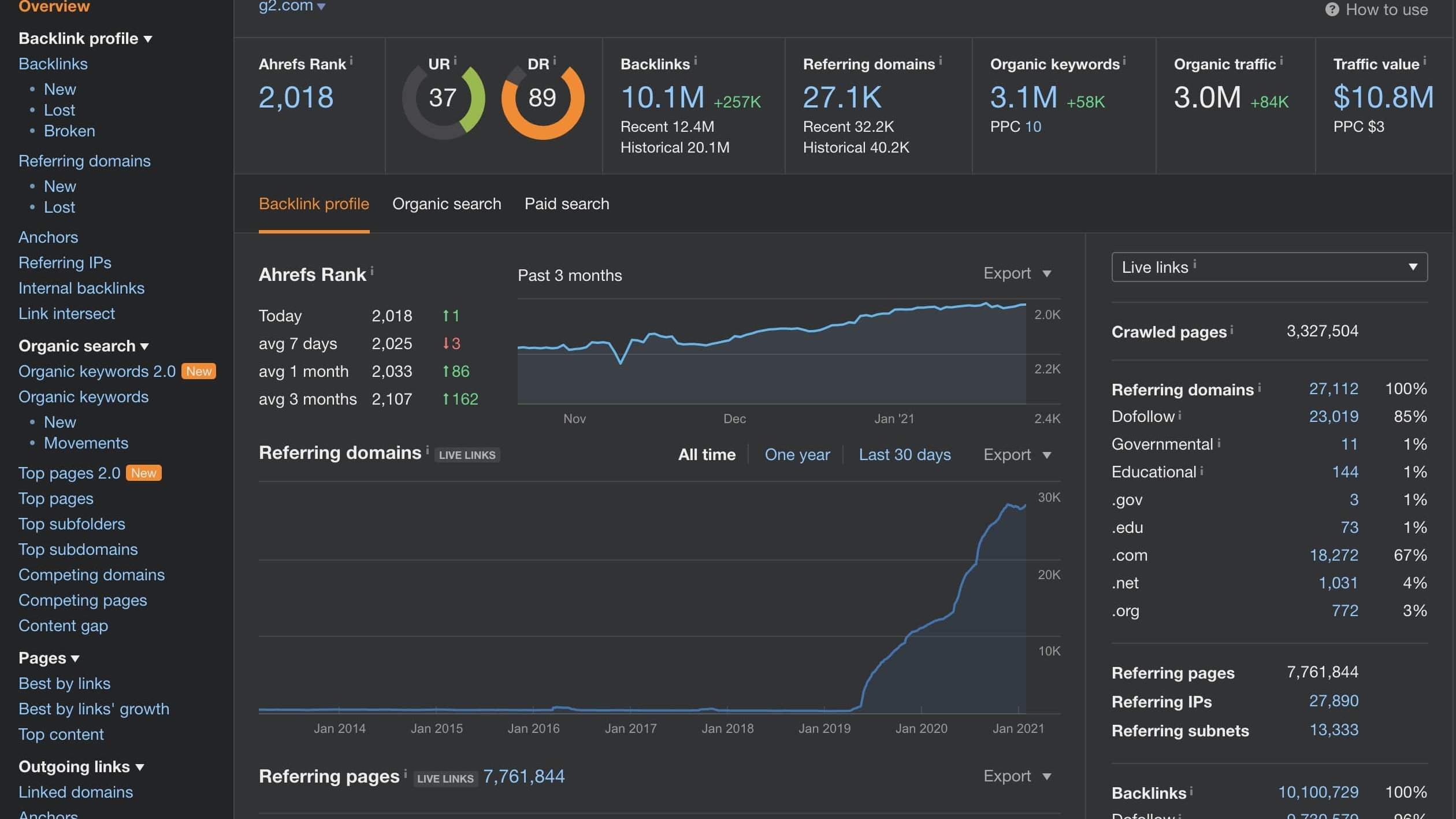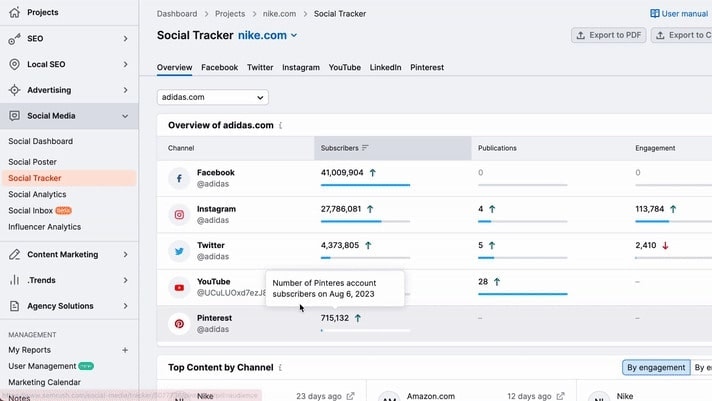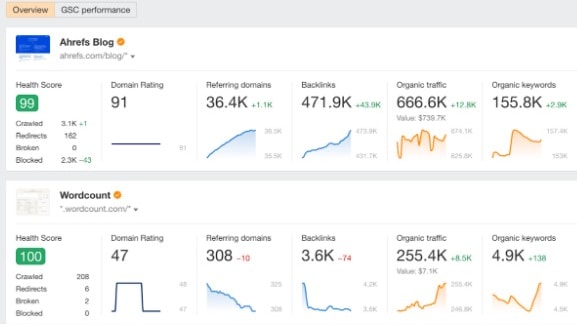Ahrefs vs Semrush: In-depth features comparison
- 01Ahrefs vs Semrush: overview
- 02What's the difference between Ahrefs and Semrush?
- 03Ahrefs pros and cons
- 04Semrush pros and cons
- 05Ahrefs compared to Semrush
- 06Semrush compared to Ahrefs
- 07Features comparison
- 08Ahrefs vs Semrush: Which is the best for your business?
- 09Promotions on SEO software
- 10Alternatives to Ahrefs & Semrush
Save up to $59 on Semrush
Save up to $59 on Semrush
SEO is a key ingredient to the success of your online business, enabling you to boost your website’s rankings in the SERPs, attract more traffic, and build trust with your customer base. But it can be challenging to stay up-to-date with the constant changes to Google’s famous algorithm while also avoiding any technical SEO mistakes that could undermine your hard work.
The good news is that there are several tools available to help you. In this article, we take a closer look at the main features and differences between two of the most popular SEO software—Ahrefs vs Semrush*—to help you decide which one your business should use.
*When you purchase through links on our website/article, we may earn an affiliate commission from Semrush
Ahrefs vs Semrush: overview
Ahrefs and Semrush are two prominent tools when it comes to SEO software, each offering unique strengths to cater to different user needs.
Ahrefs is renowned for its robust backlink analysis and keyword research capabilities. It provides comprehensive data on backlinks, allowing users to identify their website's link profile and analyze competitor strategies. Semrush, on the other hand, excels in providing a complete suite of SEO tools, including keyword research, rank tracking, site auditing, and competitive analysis. It offers an all-in-one solution for businesses looking to improve their online visibility and performance.
Now, let's delve into the comparison of Ahrefs vs Semrush. We'll explore their key features and functionalities to help you make an informed decision when selecting the ideal collaboration and communication platform for your business.
What's the difference between Ahrefs and Semrush?


Both Ahrefs and Semrush are established SEO software offering a suite of tools designed to help you boost your Google rankings and grow website traffic. To do this, they offer several common core tools for keyword research, backlinking, competitor analyses, and SEO site audits.
The main difference between the two is the different add-ons they offer, beyond these core features. Ahrefs’s add-on is its Content Explorer which helps you understand high-performing content in your niche, generate content ideas, and identify link prospects. In addition to its core SEO tools, Semrush offers PPC and social media marketing tools to run metrics on paid and social media campaigns. Semrush has also developed a range of related products including Content Marketplace to connect website owners with writers, Content Outline Builder to create briefs, and Amazon Marketing tools.
These broader offerings potentially influence Semrush’s user interface which may initially appear overwhelming to some users, especially beginners. The additional tools and data the platform presents can result in a crowded view at times, depending on how you use it. Compared to Semrush, some people might find Ahrefs interface more simple and easy to navigate. Although several Ahrefs users have also reported an initial steep learning curve as they familiarize themselves with the product’s range of features.
A final key difference is the metrics in the keyword research reports. Ahrefs gives you core metrics like search volume (including by country), ranking difficulty, and cost-per-click (CPC). It also provides insights into keyword trends. Semrush provides these same core metrics, as well as a range of other insights like estimated traffic and number of results, which is ideal for when you need more in-depth keyword research. Although, again, this extra data can make the Semrush interface feel crowded and it may take new users some time to familiarize themselves with it.
14 days free on the Pro plan + 17% off annual plans on Semrush
Get 14 days free on the Pro plan + 17% off annual plans on Semrush and up to $59 savings with Secret.
Ahrefs pros and cons
What are the advantages of Ahrefs?
- Comprehensive backlink analysis: Ahrefs provides one of the most extensive and accurate backlink databases, allowing users to monitor their own backlinks and spy on competitors' link profiles.
- Advanced keyword research: With Ahrefs' Keyword Explorer tool, users can discover relevant and high-performing keywords, including search volumes, difficulty scores, and click-through rates.
- Site audit and SEO health checks: Ahrefs offers a powerful site audit feature that identifies on-page SEO issues, broken links, and other technical SEO problems, helping users improve their website's overall health.
- Competitor analysis: Ahrefs enables users to analyze their competitors' organic search strategies, uncovering their top-ranking keywords, content gaps, and backlink sources.
- Rank tracking: Users can track their website's search rankings for specific keywords over time, allowing them to measure the success of their SEO efforts.
What are the disadvantages of Ahrefs?
- High cost: Ahrefs is considered one of the more expensive SEO tools, which may be a deterrent for smaller businesses or individuals on a budget.
- Steep learning curve: Ahrefs' extensive features and data can be overwhelming for beginners, and it may take time to fully grasp the tool's capabilities.
- Limited reporting: Some users find Ahrefs' reporting and data visualization options to be less robust compared to other SEO tools.
- Limited languages: Ahrefs primarily focuses on English-language data, which may limit its usability for websites in non-English-speaking markets.
- API limitations: Ahrefs' API has some limitations, which can impact the automation and integration capabilities for advanced users and developers.
Semrush pros and cons
What are the advantages of Semrush?
- Comprehensive keyword research: Semrush offers an extensive keyword database with search volume, keyword difficulty, and related keywords, helping users identify valuable keywords for their SEO and PPC campaigns.
- Competitive analysis: Semrush allows users to analyze their competitors' digital marketing strategies, including their top-ranking keywords, ad copies, and backlinks, providing valuable insights for improving their own campaigns.
- Backlink analysis: Users can monitor their backlink profile, identify toxic links, and discover new link-building opportunities with Semrush's backlink analysis tools.
- Site audit and on-page SEO: Semrush's site audit feature helps users identify and fix technical SEO issues on their website, optimizing it for better search engine visibility.
- Social media management: Semrush provides tools for social media scheduling, content creation, and performance tracking, streamlining social media management for businesses.
What are the disadvantages of Semrush?
- High cost: Semrush can be expensive, especially for smaller businesses or individuals on a tight budget.
- Overwhelming data: Semrush offers a wealth of data and features, which may be overwhelming for beginners or users who don't need all the functionalities.
- Limited local SEO data: While Semrush is great for global SEO research, it may not provide as much localized SEO data for certain regions.
- Steep learning curve: Mastering Semrush's various features and reports may take time and effort, especially for users new to SEO and digital marketing.
- Limited API access: Some users find Semrush's API access to be limited compared to other SEO tools, restricting the level of automation and integration possible.
Compare Semrush to other tools
Ahrefs compared to Semrush
When comparing Ahrefs and Semrush, Ahrefs stands out with its comprehensive backlink analysis and link-building capabilities. Ahrefs boasts one of the largest backlink databases, allowing users to monitor their website's link profile, identify quality backlinks, and uncover potential link-building opportunities. Its user-friendly interface and intuitive data visualization make it easy for users to gain valuable insights into their website's SEO performance.
While both tools excel in their respective areas, Ahrefs is a go-to option for those focused on backlink analysis and link-building strategies, while Semrush is a well-rounded platform catering to various aspects of digital marketing. Ultimately, the choice between Ahrefs and Semrush depends on the specific needs and objectives of each user.
Is Ahrefs better than Semrush?
Ahrefs shines with its intuitive user interface and outstanding backlink analysis tool. It offers comprehensive data on a website's backlinks, empowering users to conduct thorough SEO analysis and identify link-building opportunities. Additionally, Ahrefs boasts a larger keyword database, making it a go-to tool for in-depth keyword research.
Semrush, however, provides a more extensive suite of features, including social media tracking and content marketing tools. Its social media analytics enable users to monitor their brand's performance across various platforms and analyze competitors' social strategies. Semrush’s content marketing tools help users optimize their content for better search engine rankings.
To determine which tool is better, consider the specific aspects that are essential to your business, whether it's in-depth backlink analysis and keyword research (Ahrefs) or a comprehensive set of marketing tools including social media and content marketing features (Semrush).
What is Ahrefs best used for?
Ahrefs excels in providing valuable insights for backlink tracking and conducting comprehensive SEO analysis. Its vast index of live backlinks allows businesses to understand their competitors' link-building strategies and identify opportunities for improving their own backlink profiles. Ahrefs' keyword research tool is another standout feature, helping businesses uncover valuable organic and paid keywords to enhance their content strategy and drive more targeted traffic to their websites.
For example, an e-commerce store can use Ahrefs to analyze its competitors' backlinks and discover potential partnership opportunities with influential websites. A content marketing agency can leverage Ahrefs' keyword research tool to identify low-competition, high-volume keywords for their clients' blog posts, improving their search engine rankings.
In summary, Ahrefs is best suited for businesses that require a dedicated SEO tool to optimize their websites, stay ahead of the competition, and enhance their online visibility.
Can Ahrefs replace Semrush?
While Ahrefs can serve as a viable alternative to Semrush for certain tasks such as backlink and keyword analysis, it may not fully replace Semrush due to the differing feature sets. Semrush provides additional capabilities, including social media integration, content marketing tools, and PPC (Pay-Per-Click) analysis, which Ahrefs lacks. For instance, a digital marketing agency that heavily relies on social media marketing and paid advertising may find Semrush more suitable due to its comprehensive social media tracking and PPC campaign optimization features.
In conclusion, the decision to use Ahrefs over Semrush or vice versa will depend on the specific requirements and objectives of your business. For businesses focused on SEO-centric tasks and backlink analysis, Ahrefs can be a valuable choice. However, for those seeking a more all-in-one digital marketing solution encompassing social media, content, and PPC, Semrush may be the preferred option.
Is Ahrefs cheaper than Semrush?
In terms of pricing, Ahrefs's pricing plans are slightly less expensive than Semrush. Ahrefs's starting plan, known as "Lite," costs €89 per month, while Semrush offers an entry-level plan, the "Pro" plan, at $129.95 monthly.
Both platforms provide various plans to cater to different business sizes and needs. For example, Ahrefs offers additional plans such as "Standard," "Advanced," and "Enterprise," with varying features and price points. Similarly, Semrush has higher-tier plans like "Guru" and "Business," which include more advanced features.
However, if cost is a significant factor for your business, Ahrefs does offer a slightly cheaper alternative compared to Semrush.
Is there a better SEO software than Ahrefs?
While Ahrefs is undoubtedly a powerful SEO tool with its advanced backlink analysis and extensive keyword research capabilities, several alternatives to Ahrefs might better suit specific needs and preferences.
Semrush, for instance, stands out, as does SE Ranking, Similarweb and Moz Pro.
The best SEO software for your business will depend on factors like the features you require, budget constraints, and the specific objectives you aim to achieve in your digital marketing efforts.
Semrush compared to Ahrefs
When comparing Semrush and Ahrefs, Semrush stands out with its extensive keyword research and competitive analysis features. Semrush offers a wide range of keyword metrics, including search volume, keyword difficulty, and keyword trends, helping users identify high-value keywords for their SEO and PPC campaigns. Its competitive analysis tools allow users to analyze their competitors' organic and paid search strategies, uncovering valuable insights to improve their own digital marketing efforts.
SEMrush is ideal for those looking to conduct in-depth keyword research and competitive analysis, while Ahrefs is the go-to option for backlink analysis and link-building strategies.
Is Semrush better than Ahrefs?
While Ahrefs excels in backlink analysis and keyword research, Semrush offers a more comprehensive suite of digital marketing tools. For example, Semrush provides social media tracking features, allowing businesses to monitor and analyze their social media performance.
Additionally, Semrush offers content marketing tools like topic research and SEO writing assistance, aiding content creation efforts. Moreover, Semrush's advertising insights provide valuable data for PPC campaigns and competitive analysis.
While Ahrefs is a top choice for SEO-specific tasks, Semrush's broader range of features makes it a preferred option for businesses seeking an all-in-one digital marketing solution. The better tool ultimately depends on your specific needs and goals.
What is Semrush best used for?
Semrush is a versatile and powerful tool that caters to various digital marketing needs. Its robust SEO toolkit provides in-depth keyword research, competitor analysis, and backlink tracking.
For social media management, Semrush offers tools to monitor brand mentions, analyze competitor activity, and schedule posts. In terms of content marketing, the tool provides topic research, SEO writing assistance, and content performance tracking. Semrush's advertising features include data on ad campaigns, competitor ad insights, and keyword ad history.
Its comprehensive nature makes it an ideal choice for businesses looking to streamline their digital marketing efforts and gain a competitive edge in the online landscape.
Can Semrush replace Ahrefs?
Semrush can serve as a partial replacement for Ahrefs in certain SEO aspects, such as keyword research and competitor analysis.
Semrush offers an extensive keyword database and provides valuable insights into organic and paid keyword performance. Additionally, Semrush's broader range of features, including social media tracking and content marketing tools, makes it a more well-rounded digital marketing solution compared to Ahrefs. However, Ahrefs remains unparalleled in its backlink analysis capabilities, offering comprehensive data on backlinks and their quality.
So, while Semrush can be a valuable tool for overall digital marketing efforts, Ahrefs' specific strengths in backlink analysis may still be irreplaceable for some users.
Is Semrush cheaper than Ahrefs?
In terms of pricing, Semrush is indeed generally more expensive than Ahrefs. For example, Semrush's entry-level plan starts at $129.95 per month, while Ahrefs' basic plan starts at €89 per month.
However, it's essential to consider the value that each platform offers for the investment. Semrush provides a broader suite of digital marketing tools, including social media tracking, content marketing features, and comprehensive advertising insights, which may justify the higher cost for some businesses looking for a more holistic approach to their SEO and marketing strategy.
On the other hand, Ahrefs focuses primarily on backlink analysis and keyword research, making it suitable for specific SEO needs.
Is there a better SEO software than Semrush?
While it is undoubtedly a powerful SEO tool, the digital marketing landscape does offer several alternatives to Semrush that may be considered better depending on your specific requirements.
For instance, Meltwater, SE Ranking, Ahrefs, Similarweb and Hootsuite are just a few tools that match the comprehensive suite of features offered by Semrush.
The best SEO software for your business will depend on the specific features, budget, and objectives you prioritize.
14 days free on the Pro plan + 17% off annual plans on Semrush
Get 14 days free on the Pro plan + 17% off annual plans on Semrush and up to $59 savings with Secret.
Features comparison
Ahrefs Takes the Lead Against Semrush for Ease of Use

When it comes to user experience and navigability, Ahrefs may have an edge over Semrush. Both tools are feature-rich and provide a wealth of useful data, but Ahrefs shines in terms of its sleek interface and the simplicity of obtaining that information. Ahrefs has made significant strides in making its extensive features more intuitive and easier for users to navigate. The platform is designed in a way that you rarely need more than a couple of clicks to get the data you need, making complex SEO tasks simpler.
Semrush, while also packed with features and capabilities, has a steeper learning curve due to its interface and layout. Although it provides comprehensive data and SEO tools similar to Ahrefs, new users might find Semrush slightly more challenging to get accustomed to. In this aspect, Ahrefs takes the lead with a more straightforward and user-friendly platform, significantly reducing the time it takes to become proficient in using the software.
Ahrefs's Web Tracking is More Comprehensive than that of Semrush

Ahrefs's web tracking feature indeed offers a more comprehensive approach to understanding website visitors and their behavior. With Ahrefs, you can track various key performance indicators (KPIs) such as page views, bounce rates, click-through rates, and conversions. This detailed data allows you to gain deeper insights into your audience's preferences and optimize your website accordingly.
While Semrush, however, does provide valuable competitor analysis and web traffic data, its focus is primarily on analyzing competitor strategies and identifying potential opportunities. While this information is valuable, it may not offer the same level of granular detail as Ahrefs's Web Tracking.
In conclusion, if you seek a tool that provides extensive data and insights into your website's performance and audience behavior, Ahrefs's web tracking feature may be the better choice. However, for those more interested in competitor analysis and strategic opportunities, Semrush can still be a valuable tool. Ultimately, the decision depends on your specific needs and priorities.
Ahrefs's SEO Auditing & Monitoring Surpasses Semrush’s

Ahrefs stands out for its SEO auditing & monitoring feature, which offers a comprehensive analysis of your website's SEO health. It thoroughly examines various aspects of your site, such as backlinks, site structure, and on-page SEO elements, to identify potential issues and areas for improvement. The tool also allows you to monitor your website's performance over time, keeping track of changes in search engine rankings and organic traffic.
In contrast, Semrush does provide some optimization recommendations for SEO, but it doesn't offer the same level of in-depth auditing and monitoring capabilities as Ahrefs. While Semrush is a versatile digital marketing tool that covers a wide range of aspects, Ahrefs excels specifically in SEO analysis and monitoring, making it a preferred choice for businesses focusing on improving their search engine visibility.
Semrush Excels at Competitive Strategy for Social Networks over Ahrefs

Semrush's competitive strategy for social networks is indeed one of its strong suits, offering marketers invaluable insights into social media performance and competitor activities. With Semrush, you can analyze your social media posts' engagement, track your follower growth, and identify trending topics within your industry. Additionally, Semrush allows you to benchmark your social media performance against your competitors, empowering you to fine-tune your social media campaigns for better results.
On the other hand, while Ahrefs excels in SEO and backlink analysis, it does not offer the same level of in-depth social media analytics and competitor monitoring that Semrush provides. As a result, for businesses that heavily rely on social media as part of their marketing strategy, Semrush can be the preferred choice due to its robust social media tools.
Ahrefs Outperforms Semrush with its Extensive App Directory

On the topic of integrations, Semrush shows exceptional prowess compared to Ahrefs. Semrush integrates seamlessly with numerous platforms and external tools, thereby expanding its functionality and allowing for a more blended approach to SEO and digital marketing. Semrush’s integration capacity includes WordPress, Google Analytics, Google Search Console, Trello, and many others. This wide range of integrations allows for an end-to-end marketing analysis, from SEO to social media, content marketing, and more.
While Ahrefs offers a robust set of features, its integrations are limited in comparison. Ahrefs' primary focus is on delivering top-notch SEO tools and insights and does not offer the same breadth of external integrations as Semrush. If a business relies heavily on integrations for synergy across their various marketing channels, Semrush outperforms Ahrefs in this area providing a more integrated and holistic approach to online marketing.
Semrush's Offer Content Adapted to Target Audiences is More Specific

Semrush's content creation feature excels in tailoring content to specific target audiences, providing valuable suggestions for optimization to enhance engagement and user experience. By analyzing audience behavior, search intent, and keyword trends, Semrush ensures that your content aligns perfectly with what your target users are looking for. For example, it can recommend relevant topics, identify popular questions, and suggest ideal word counts for your articles to maximize their impact.
While Ahrefs also offers SEO content & rankings features to optimize content for search engine rankings, it may lack the same level of audience-specific customization that Semrush provides. Ahrefs primarily focuses on keyword research and search engine performance, which is beneficial for SEO purposes but may not fully address the nuances of audience targeting and content personalization that Semrush excels in.
Ahref's Customizable Dashboard Offers More Flexibility

Ahrefs stands out with its customizable dashboard feature, offering users unparalleled flexibility and personalization options. With this feature, users can create their own personalized dashboards, choosing the specific metrics and data they want to monitor regularly. For example, a digital marketer focused on competitor analysis can customize their dashboard to display competitor backlink data, organic search traffic, and keyword rankings prominently. On the other hand, a content strategist might prioritize content performance metrics like page views, social shares, and organic keywords.
This level of customization ensures that users can access the information most relevant to their unique objectives and workflows. It empowers them to make data-driven decisions and gain valuable insights specific to their niche or industry. By allowing users to control their dashboard, Ahrefs ensures a user-centric experience that enhances productivity and efficiency in digital marketing efforts.
Subscribe to our newsletters.
No FOMO here. Stay up-to-date on all the latest deals and news with our monthly newsletter straight to your inbox like 112,000+ entrepreneurs (+ Get 10% off on on our Premium Membership!)
Ahrefs vs Semrush: Which is the best for your business?
Ahrefs is the best tool for you if:
- Your SEO strategy focuses on link-building and you need a tool that provides detailed backlinking analyses
- An extensive keyword database is a priority for in-depth keyword research
- You prefer an intuitive user interface that is easy to navigate and find the SEO data you need in just a few clicks
- Budgetary considerations are an important deciding factor and you want to start with a free plan or more affordable SEO tool
- Web tracking is a specific metric of interest to you and you’re seeking deep insights into your website visitors and their interactions with your site
Semrush is the best tool for you if:
- You want an all-in-one digital marketing solution with a broad suite of SEO tools including keyword research, site audits, competitor analysis, and rank tracking
- In-depth competitor analysis is a keystone of your digital marketing strategy and you’re seeking data on competitors’ organic and paid search strategies
- PPC campaigns feature heavily in your digital marketing strategy and you’re looking for data to optimize them
- You run social media marketing campaigns and need supporting analytics tools to learn more about engagement and audience demographics
- You’re seeking additional content marketing and management tools to complement your SEO strategy
14 days free on the Pro plan + 17% off annual plans on Semrush
Get 14 days free on the Pro plan + 17% off annual plans on Semrush and up to $59 savings with Secret.
Alternatives to Ahrefs & Semrush
Promotions on SEO software
Start saving on the best SaaS with Secret.
Secret has already helped tens of thousands of startups save millions on the best SaaS like Ahrefs, Semrush & many more. Join Secret now to buy software the smart way.














